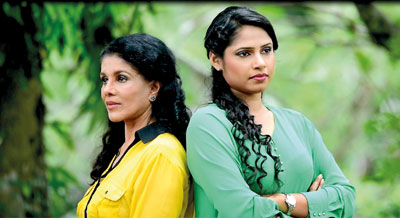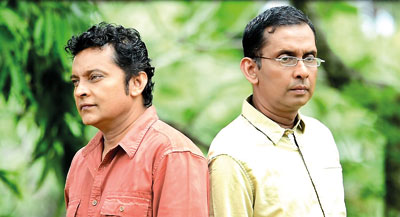Cinema talents tested in theatre
Breaking two decade of silence, award winning playwright Tanuj Anawarathne has made ‘Handa Eliyata Wedi Thiyanna’ (Kill The Moonlight) with veteran stage stars and cinema stars. Starring in the main roles internationally famed cinema actress Nita Fernando and multi-awarded Janaka Kumbukge, the play will have its maiden shows at 7 pm on September 16 and 27 at the Namel Malini Punchi Theatre, Borella.
Produced by Iranthi Abeyasinghe two other roles in the four member cast is played by Jayanath Bandara, Nadeeshani Peliarachchi.
“It’s almost 20 years since I did my last stage play ‘Heta Kaluwara Nehe” says Tanuj Anawaratne who started his career as a playwright with his award winning play ‘Parajithayo’ in 1994,”. Tanuj won both the Best Script and the Best Production for his maiden and won the same two awards in 1997 for his play ‘Sandalamala’.
Breaking away from theatre, Tanuj entered cinema and directed ‘Nisala Gira’.
“The script of ‘Handa Eliyata Wedi Tiyanna’ was written sometime ago and whoever read it insisted that I should make a play” says Anawaratne adding that even when he wrote the script Nita Fernando was in his mind for the lead role.
According to Tanuj the play is about how people use each other to reach their targets. “But there comes to a point where people get isolated and you can not use others anymore,”. Asked as to what inspired him to write such a script, the playwright says it was from the experiences he went through while living in this society.
“Handa Eliyata Wedi Tiyanna” narrates around Janaki, Rohan’s wife who is older than him and also happens to be the daughter of the State Cultural Minister.
Her father’s influence has made Rohan the Director General of State Cultural Department, but both are deeply frustrated by not having children. Rohan seeks advice from his friend Dr. Sumith, a gynecologist. Dr. Sumith’s diagnosis finds Janaki not being fertile, but Rohan hides it from her and continues to maintain an image of a happy marriage in the public eye, despite Janaki carrying false hopes of becoming a mother. Meanwhile Rohan starts an affair with his private secretary Sankethi and she becomes pregnant. Knowing Janaki’s infertility, Sankethi hides her pregnancy from Rohan but he comes to know about it after five months.
Rohan meets with his friend Dr. Sumith again and asks him to perform an abortion on Sankethi. Dr. Sumith rejects this citing that it is too late to perform an abortion. Dr. Sumith advises Rohan to hide himself 0.until the dust is settled. Drama ends with Janaki and Sankethi randomly running into each other at a park, which Rohan has frequented with both separately on previous occasions. Not knowing each other’s true identities, two women engage in small talk. Janaki informs Sankethi about her missing husband and how she is still waiting for his return. Sankethi in return, informs Janaki about she being pregnant with her now-missing boyfriend’s child and expresses her decision to move on with her life until she meets someone who accepts her as she is; a single mother with a child out of wedlock.
“Cinema was challenged when the television was introduced. It was further challenged with the introduction of the internet. But theatre was never challenged by any of these new media. Theatre is a live medium and it is powerful,” said the director when asked about the reason for his return to theatre after two decades.
“This stage play was a refreshing and exciting experience for me,” says Nita Fernando, one of the most experienced actresses in Sri Lankan cinema. “I played Sandakinduri (mermaid) in Gunasena Galappatti’s ‘Sandakinduru’ play and ‘Thaththa’ (Father) by the same director. Both these were performed in early 1970s,” adds Nita. “But with too many films coming my way, I had to give up the stage,’ she said adding that it was a challenge for her to get back to the theatre.
Additionally Nita has been assigned to contribute with some vocal renditions in the play. “I started to learn music and voice training under the late maestro Premasiri Khemadasa but I could not complete it as I was busy with cinema,” Nita said reminiscing her past experiences to master her musical talents. “But my singing in the play has to be decided by the audience on September 26 and 27,” she chuckles.
The play has already got some bookings and it is to be performed around the country.




